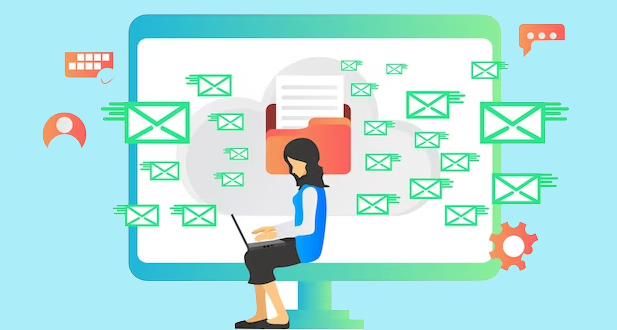About The Pros and Cons of Free Email Solutions
Email solutions refer to the various tools, technologies, and services that enable individuals and organizations to effectively manage and communicate through email. Email has become an essential communication tool in both personal and professional settings, allowing for efficient and instant exchange of messages, documents, and other types of information.
One of the key aspects of email solutions is the email client, which is a software application that enables users to send, receive, and manage their emails. Popular email clients include Microsoft Outlook, Gmail, Apple Mail, and Mozilla Thunderbird. These clients provide a user-friendly interface that allows users to compose, organize, and access their emails. They often offer features such as email filtering, folders, search capabilities, and integration with calendars and contacts.
In addition to email clients, email solutions also involve email servers. An email server is responsible for receiving, storing, and delivering emails between different users and domains. It acts as a central hub that facilitates the transfer of messages across the internet. Popular email server software includes Microsoft Exchange Server, Postfix, and Sendmail. These servers ensure the reliable and secure transmission of emails, implementing protocols such as SMTP (Simple Mail Transfer Protocol) and POP3 (Post Office Protocol 3) or IMAP (Internet Message Access Protocol) for email retrieval.
Email solutions also encompass features that enhance email functionality and productivity. For instance, email encryption provides a layer of security to protect sensitive information within emails from unauthorized access. Encryption ensures that messages are encrypted before being sent and can only be decrypted by the intended recipient. This is crucial for safeguarding confidential data and complying with privacy regulations.
Another essential aspect of email solutions is spam filtering. Spam refers to unsolicited and often malicious emails that flood inboxes, causing inconvenience and potential security risks. Spam filters use algorithms and rules to identify and block spam messages, reducing clutter and improving the overall email experience. These filters can be configured to suit individual preferences, allowing users to customize the level of strictness in spam detection.
Furthermore, email solutions often incorporate features for collaboration and productivity. For example, shared calendars and scheduling tools enable users to manage appointments, meetings, and events within their email environment. Users can create, share, and update calendars, allowing colleagues or team members to view their availability and schedule meetings accordingly. Additionally, email solutions may include integration with project management tools, document sharing platforms, and other productivity applications to streamline workflows and enhance collaboration.
Email solutions are not limited to individual users. Many organizations require more advanced and comprehensive email services tailored to their specific needs. This is where enterprise email solutions come into play. Enterprise email solutions provide organizations with email services that cater to their scale, security, and collaboration requirements. These solutions may include features like centralized user management, data loss prevention, archiving, and compliance functionalities to meet regulatory obligations.
Email solutions encompass a range of tools, technologies, and services that enable efficient and effective email communication. From email clients and servers to encryption, spam filtering, and collaboration features, these solutions play a crucial role in facilitating communication and productivity in personal and professional settings. Whether for individual users or large organizations, email solutions are an integral part of modern communication systems.
The Pros of Free Email Solutions
In today’s digital age, email has become an essential communication tool. Whether it’s for personal or professional use, having a reliable email service is crucial. While there are many paid email solutions available, free email services also offer numerous advantages. In this article, we will explore the pros of using free email solutions.
Cost-effectiveness: The most apparent advantage of free email solutions is that they do not require any financial investment. Individuals and businesses can create and use email accounts without incurring any expenses. This is particularly beneficial for startups, small businesses, and individuals on a tight budget who may not have the resources to invest in a paid email service.
Accessibility: Free email solutions are easily accessible to anyone with an internet connection. They can be accessed from any device with a web browser, including computers, smartphones, and tablets. This level of accessibility allows users to stay connected and manage their emails regardless of their location, making it convenient for people who are frequently on the go.
User-Friendly Interface: Many free email solutions offer intuitive and user-friendly interfaces. They are designed to be easy to navigate, even for individuals who are not tech-savvy. These interfaces often include features such as drag-and-drop functionality, customizable folders, and advanced search options, making it simple for users to organize and find their emails efficiently.
Large Storage Capacity: Free email solutions typically provide a generous amount of storage space for users to store their emails and attachments. While the storage capacity may vary among providers, it is usually sufficient for most users’ needs. This eliminates the need to constantly delete emails to free up space and allows users to maintain an extensive email archive.
Spam Filtering: Another advantage of free email solutions is the built-in spam filtering capabilities. These services often employ advanced algorithms and machine learning techniques to automatically detect and filter out spam emails, reducing the clutter in users’ inboxes. This feature saves users time and ensures that important emails are not buried among unwanted messages.
Integration with Other Services: Free email solutions often integrate with other services and platforms, enhancing their functionality. For example, many providers offer seamless integration with cloud storage services, allowing users to easily attach files from their cloud storage accounts. Additionally, they may integrate with calendar applications, enabling users to schedule appointments, set reminders, and manage their time effectively.
Customization Options: While free email solutions may not offer the same level of customization as paid services, they still provide a range of options to personalize the user experience. Users can typically choose their email signature, customize the layout and color scheme, and set up filters and rules to automate email management. These customization features allow users to tailor their email interface to suit their preferences and needs.
Reliability and Security: Free email solutions offered by reputable providers are generally reliable and secure. These providers invest in robust infrastructure and employ measures to protect user data from unauthorized access and cyber threats. While no system is entirely immune to security breaches, choosing a trusted and well-established free email service can provide a high level of reliability and security for everyday email communications.
Additional Features: Many free email solutions offer additional features and tools to enhance productivity and convenience. These may include features like email forwarding, autoresponders, email aliases, and the ability to create multiple email addresses under one account. These features allow users to streamline their email management and tailor their email communication to specific needs.
Large User Base: Free email services often have a large user base, which can be advantageous in terms of connectivity and networking. It is easier to connect and communicate with individuals who are using the same email service, particularly if they are friends, colleagues, or business partners. Additionally, some providers offer community forums or social features that allow users to interact and seek assistance from other users.
The Cons of Free Email Solutions
Free email solutions have become an integral part of our digital lives, offering convenience and accessibility. However, these services come with their fair share of drawbacks. In this article, we will explore the cons of free email solutions, highlighting issues such as limited storage, privacy concerns, lack of customer support, and potential for spam and phishing attacks.
Limited Storage:
One of the significant downsides of free email solutions is the limited storage space they provide. Most free email providers offer a limited amount of storage, which can quickly fill up, especially if you frequently receive large attachments or emails with multimedia content. When you reach the storage limit, you may be forced to delete emails or purchase additional storage, which can be inconvenient and add to your expenses.
Privacy Concerns:
Privacy is a growing concern in the digital age, and free email solutions often raise red flags in this regard. Ad-supported free email services tend to scan your emails and use the information to serve you targeted ads. While this practice may seem harmless, it raises questions about the privacy and security of your personal data. Additionally, some free email providers have faced controversies related to unauthorized data sharing and breaches, further compromising user privacy.
Lack of Customer Support:
Free email solutions typically offer limited or no customer support to their users. Since you’re not paying for the service, you have limited recourse when you encounter issues or need assistance. This lack of customer support can be frustrating, particularly when you’re facing critical problems such as hacked accounts or lost emails. Resolving such issues becomes a challenge without dedicated support channels, leaving users feeling helpless and vulnerable.
Spam and Phishing Attacks:
Free email solutions are often targeted by spammers and scammers due to their large user bases. As a result, users of these services are more likely to receive unsolicited emails and fall victim to phishing attacks. Phishing emails can trick users into revealing sensitive information such as passwords or credit card details, leading to identity theft or financial loss. While email providers employ filters to catch spam and malicious emails, some still manage to slip through, making users more susceptible to these threats.
Limited Features and Customization:
Compared to paid email solutions, free email services typically offer limited features and customization options. Features like advanced filters, email forwarding, and email aliases are often reserved for paid subscriptions. Customization options, such as personalized domains or branding, are also restricted or not available at all for free users. These limitations can hamper productivity and professional image, particularly for individuals and businesses that require a more robust and tailored email experience.
Advertisement Clutter:
Free email solutions rely on advertisements to generate revenue, leading to an inevitable clutter of ads in your inbox. Advertisements can distract and disrupt the email reading experience, making it challenging to focus on important messages. Moreover, some ads may contain malicious links or content, posing potential security risks. While ad-blocking tools can mitigate this issue, they are not always foolproof, leaving users exposed to unwanted and potentially harmful ads.
Inability to Change Email Provider:
Once you’ve signed up for a free email solution and built a network of contacts and communications around that address, switching to a different provider becomes a cumbersome process. Moving your emails, contacts, and other data to a new account can be time-consuming and may result in the loss of important information. The lack of portability and the dependency on a specific provider can restrict your options and make it challenging to migrate to a more suitable or secure platform.
While free email solutions offer convenience and accessibility, they come with several downsides. Limited storage, privacy concerns, lack of customer support, susceptibility to spam and phishing attacks, limited features and customization options, advertisement clutter, and the inability to change providers are some of the cons associated with these services.
Conclusion
In conclusion, free email solutions offer numerous benefits that make them a viable option for individuals and businesses alike. From cost-effectiveness and accessibility to user-friendly interfaces and customization options, these services provide essential features without requiring a financial investment. While they may not offer the same level of advanced features and support as paid email services, free email solutions can meet the needs of many users efficiently and reliably.
Frequently Asked Questions
Yes, free email solutions often come with limitations such as advertisements within the email interface, limited customer support, potential privacy concerns due to data mining for targeted advertising, and restrictions on file attachment sizes.
While free email solutions generally have security measures in place, their level of security may not be as robust as that of paid email solutions. Users should be cautious about phishing attempts, email scams, and take additional steps to secure their accounts, such as using strong passwords and enabling two-factor authentication.
Yes, many individuals and businesses use free email solutions for professional communication. However, using a custom domain email address (e.g., yourname@yourbusiness.com) can provide a more professional image and may be worth considering.
When you exceed the storage limit, you may be unable to receive new emails until you clear some space. You may need to delete old emails or upgrade to a paid email solution with higher storage capacity.
Yes, there are paid email solutions available that offer additional features, enhanced security, dedicated customer support, and higher storage capacities. These paid options are often suitable for businesses or users with specific needs.




